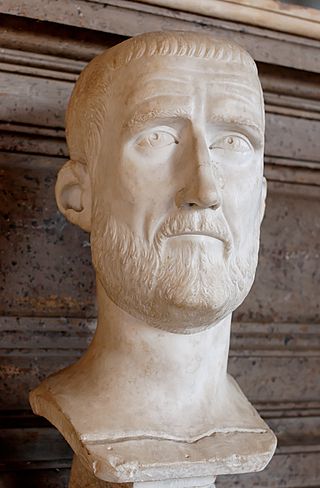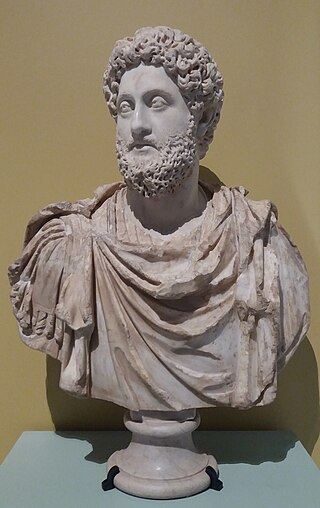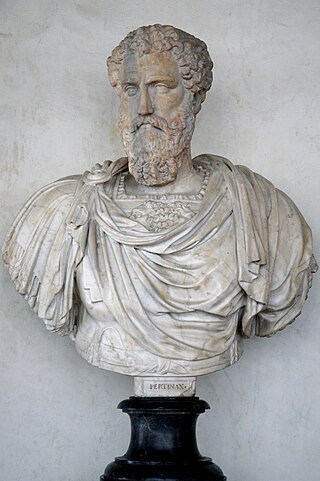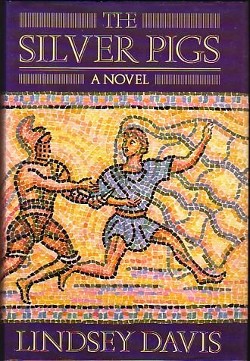
Year 276 (CCLXXVI) was a leap year starting on Saturday of the Julian calendar. At the time, it was known as the Year of the Consulship of Tacitus and Aemilianus. The denomination 276 for this year has been used since the early medieval period, when the Anno Domini calendar era became the prevalent method in Europe for naming years.

Commodus was a Roman emperor who ruled from 177 to 192. He served jointly with his father Marcus Aurelius from 177 until the latter's death in 180, and thereafter he reigned alone until his assassination by Narcissus. His reign is commonly thought to mark the end of a golden age of peace and prosperity in the history of the Roman Empire.

Gordian I was Roman emperor for 22 days with his son Gordian II in 238, the Year of the Six Emperors. Caught up in a rebellion against the Emperor Maximinus Thrax, he was defeated by forces loyal to Maximinus, and he committed suicide after the death of his son.

Publius Helvius Pertinax was Roman emperor for the first three months of 193. He succeeded Commodus to become the first emperor during the tumultuous Year of the Five Emperors.

Roma Eterna is a science fiction fixup novel by American writer Robert Silverberg, published in 2003, which presents an alternative history in which the Roman Empire survives to the present day. Each of the ten chapters was first published as a short story, six of them in Asimov's Science Fiction, between 1989 and 2003.

Titus is a 1999 epic surrealist historical drama film directed and written by Julie Taymor in her directorial debut. Adapted from William Shakespeare's revenge tragedy Titus Andronicus, the movie stars Anthony Hopkins as the titular Roman general, chronicling his downfall after returning victorious from war. The film was co-produced with Jody Patton and Conchita Airoldi. The film was a co-production of the United States, the United Kingdom, and Italy; produced by Overseas Filmgroup and Clear Blue Sky Productions and released by Fox Searchlight Pictures.

The conspiracy of Gaius Calpurnius Piso in AD 65 was a major turning point in the reign of the Roman emperor Nero. The plot reflected the growing discontent among the ruling class of the Roman state with Nero's increasingly despotic leadership, and as a result is a significant event on the road toward his eventual suicide and the chaos of the Year of the Four Emperors which followed.

Claudia Antonia was the daughter and oldest surviving child of the Roman Emperor Claudius and the only child of his second wife Aelia Paetina. Antonia was a great great-niece of the Emperor Augustus, great-niece of the Emperor Tiberius, first cousin of the Emperor Caligula, half-sister to Claudia Octavia and Britannicus, and cousin, stepsister and sister-in-law of the Emperor Nero.
Pap was king of Armenia from 370 until 374/375, and a member of the Arsacid dynasty. His reign saw a short, but notable period of stabilization after years of political turmoil. Although Armenia had been conquered and devastated by the Sassanid king Shapur II in 367/368, Pap was restored to the throne at a young age with Roman assistance in 370. Early in his reign, Armenia and Rome won a joint victory over the Persians at the Battle of Bagavan, and some former territories of the kingdom were reconquered by the efforts of his sparapet (general-in-chief) Mushegh Mamikonian. Although Pap's reign began with a reconciliation of the monarchy, nobility and church, his relations with the church soon deteriorated. Pap allegedly had the Patriarch of Armenia, Nerses I, poisoned, although some later historians doubt this narrative. Pap also eventually ran afoul of the Romans, who suspected him of colluding with the Persians. The emperor Valens unsuccessfully attempted to assassinate him in 373/374, but ultimately succeeded in having him killed in 374/375. He was succeeded by his nephew Varazdat as king.

Empire is an American historical television series for ABC. It is an historical drama set in 44 BC Rome, and covers the struggle of a young Octavius, the nephew and heir of Julius Caesar, to become the first emperor of Rome. Octavius is helped in his quest by a fictitious gladiator called Tyrannus.

The Silver Pigs is a 1989 historical mystery crime novel by Lindsey Davis and the first book in the Marcus Didius Falco Mysteries series. Set in Rome and Britannia during AD 70, just after the year of the four emperors, the novel stars Marcus Didius Falco, informer and imperial agent. The book's title refers to 200-pound lead ingots "pigs" filled with silver ore and stolen from Roman Britain, which feature prominently in the plot.

Venus in Copper is a 1991 historical mystery crime novel by Lindsey Davis and the third book of the Marcus Didius Falco Mysteries series. Set in Rome during AD 71, just after the year of the four emperors, the novel stars Marcus Didius Falco, informer and imperial agent. The copper of the title refers to a simple copper signet ring featuring a portrait of Venus, worn by the suspect Severina Zotica. That Venus was the goddess of love hints at the motives for some of the murders perpetrated by the suspect: revenge out of unrequited love.

Rome Burning is the second book of Sophia McDougall's trilogy, following her debut novel, Romanitas, set in a world where the Roman Empire has survived to contemporary times.

Julius Caesar was assassinated by a group of senators on the Ides of March of 44 BC during a meeting of the Senate at the Curia of Pompey of the Theatre of Pompey in Rome where the senators stabbed Caesar 23 times. They claimed to be acting over fears that Caesar's unprecedented concentration of power during his dictatorship was undermining the Roman Republic. At least 60 to 70 senators were party to the conspiracy, led by Marcus Junius Brutus, Gaius Cassius Longinus, and Decimus Junius Brutus Albinus. Despite the death of Caesar, the conspirators were unable to restore the institutions of the Republic. The ramifications of the assassination led to his martyrdom, the Liberators' civil war and ultimately to the Principate period of the Roman Empire.
Quintus Aemilius Laetus was a prefect of the Roman imperial bodyguard, known as the Praetorian Guard, from 191 until his death in 193. He acceded to this position upon the deaths of his predecessors Regillus and Lucius Julius Vehilius Gratus Julianus, by appointment of emperor Commodus. His name suggests that his family received Roman citizenship from Marcus Aemilius Lepidus.
Marcellus was an Eastern Roman judicial official, one of the closest aides of the Byzantine emperor Justinian I and commander of the imperial bodyguard of the excubitores in circa 541–552.

The gens Annia was a plebeian family at ancient Rome. Livy mentions a Lucius Annius, praetor of the Roman colony of Setia, in 340 BC, and other Annii are mentioned at Rome during this period. Members of this gens held various positions of authority from the time of the Second Punic War, and Titus Annius Luscus attained the consulship in 153 BC. In the second century AD, the Annii gained the Empire itself; Marcus Aurelius was descended from this family.

Enemies at Home is a 2014 historical mystery crime novel by Lindsey Davis and the second book of the Flavia Alba Mysteries series. Set in Ancient Rome beginning in June AD 89, two months after the events of The Ides of April (2013), the novel stars Flavia Albia, the British-born adopted daughter of Marcus Didius Falco. Albia, a widow, works as a "delatrix" in ancient Rome, like Falco. The book's cover bears an image of two silver cups, one toppled, and a broken rope. It carries the strapline: "A Flavia Albia Novel".

Slavery was common in the early Roman Empire and Classical Greece. It was legal in the Byzantine Empire but it was transformed significantly from the 4th century onward as slavery came to play a diminished role in the economy. Laws gradually diminished the power of slaveholders and improved the rights of slaves by restricting a master’s right to abuse, prostitute, expose, and murder slaves. Slavery became rare after the first half of 7th century. From 11th century, semi-feudal relations largely replaced slavery. Under the influence of Christianity, views of slavery shifted: by the 10th century slaves were viewed as potential citizens, rather than property or chattel. Slavery was also seen as "an evil contrary to nature, created by man's selfishness", although it remained legal.
















